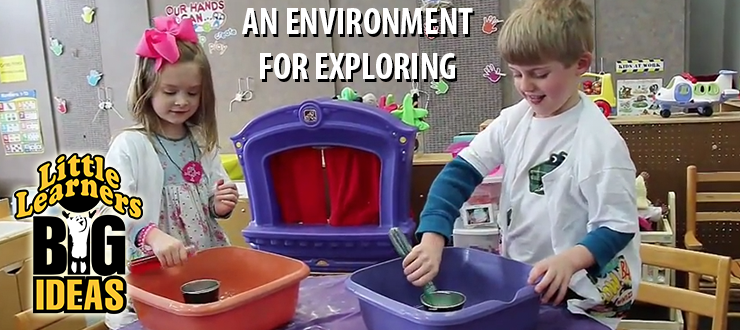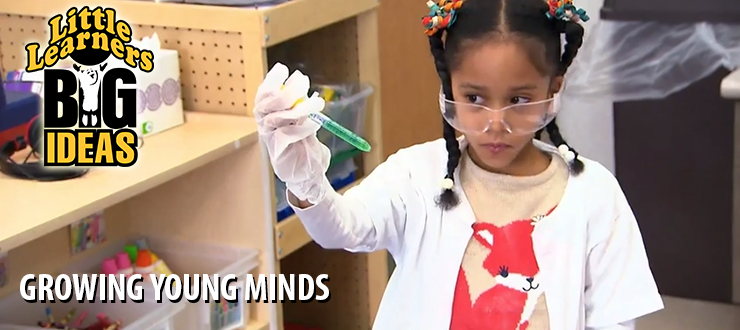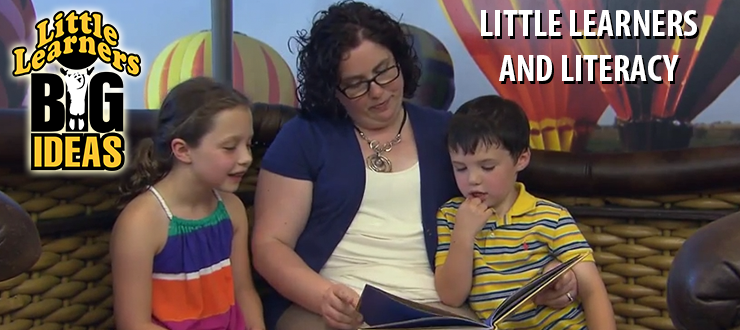Little Learners, Big Ideas
When we think of helping young children become innovators, we often imagine them exploring, investigating, and creating. We envision them designing buildings, exploring bubbling science experiments, or writing the next great novel. We know our little learners are full of BIG ideas, but we also know they cannot do it alone. As educators and parents, how do we help our children become the next great innovators? The truth is the foundation for great thinking starts long before a child steps foot inside a school. The first years of a child's life are a magical time full of curiosity and wonder. It can be a daunting task for parents and teachers to think about how to harness all of that wonder and turn it into an opportunity for learning.
In 2014, The Center for Gifted Studies at Western Kentucky University and Innovate Kentucky received a $150,000 grant from the PNC Foundation as part of its Grow Up Great Initiative. This grant was used to create a six-part video series to help educators and parents learn practical, easy-to-implement strategies to support young children in the development of critical thinking skills. Filming occurred throughout the spring 2014 semester at a wide variety of locations including a Winter Super Saturdays class for a group of kindergarten learners with BIG ideas, a fun filled day of science investigation with twenty-three parents and children at the Kentucky Science Center in Louisville, an afternoon of reading at the Warren County Public Library, and an outdoor adventure at Lost River Cave.
In order to reach more families and to provide interactive demonstrations of the concepts in the videos, Little Learners, Big Ideas has evolved to include special events with area educators through a partnership with Barnes and Noble and Warren County Public Libraries, and training and presentations for school districts, educational cooperatives, and state and city conference for teachers and librarians. For articles and photos on past events, see the Little Learners page on The Center's blog, Happenings at The Center for Gifted Studies.
Little Learners, Big Ideas Videos
The videos center on the following BIG ideas in Early Childhood Education:
Little Learners, Big Ideas: Little Learners and Literacy

When we hear the word literacy, we often think it means reading. However, the truth is literacy begins long before
a child identifies her first letter or reads his first word. Literacy is speaking.
Literacy is listening. Literacy is writing.
Literacy is connected to everything we do.
If we expect our little learners to explore their great ideas, they need to be able to share them through listening and speaking. As children get older, they will communicate through reading and writing. All areas of literacy are connected; therefore, it is important that we give them many opportunities as young thinkers to practice these skills. This video will focus on helping parents and educators take advantage of opportunities to promote literacy skills in their little learner.
Little Learners, Big Ideas: Wonder and Curiosity

Why does the rain fall down? How did my paint water turn green? What makes flowers grow in spring? Children are naturally curious. They question everything around them. One recent survey suggested that preschool aged children ask between 200-400 questions per day. Children are born to be little learners.
We know that questioning is a critical part of thinking and problem solving. However, as parents and teachers, these curious minds provide us with a fragile opportunity. Our reactions to their questions give us a chance to either encourage or stifle learning. The same survey found that by the time children are nine they are asking only about 140 questions per day. Often that number will continue to drop as they go through school. This video will focus on helping parents and teachers understand how to respond to questions and kindle the fire of wonder and curiosity.
Little Learners, Big Ideas: Learning on the Go


Learning doesn't have to always take place in school or the home. As a matter of fact, it shouldn't always occur in those places. Authentic learning can happen anywhere: the museum, the library, the backyard, the grocery. John Holt, author of How Children Learn says, "There is no difference in living and learning.... It is harmful and misleading to think of them as being separate."
Learning while out in the real world provides children the opportunity to be curious about the world around them, to understand that they can learn anywhere at any time, to use new vocabulary, and to solve problems as they make sense of the world around them. It is also very engaging. Engagement is the key to learning. Learning on the Go will give parents and educators simple but powerful ideas to help their young child learn.
Little Learners, Big Ideas: Growing Young Minds

Like a tree, a young mind is constantly growing and changing. It needs challenge, reassurance, and modeling to reach its full potential. If we expect children to learn and innovate, we should also expect them to make mistakes. Working through failure is difficult, even as adults. However, if a person is really working to her full potential, she will make mistakes. It is a natural part of learning, but it is not always easy. Oftentimes children do not know how to react to failure and challenge. They will sometimes want to shut down which, in turn, stops learning.
Children need an opportunity to be challenged in order to experience this type of learning. They also need adults to help them learn to persevere when things are difficult. This video will give parents and educators quick and easy tips to help ensure that children are challenged and strategies to help children learn from their mistakes. After all, mistakes are just proof you are learning!
Little Learners, Big Ideas: An Environment for Learning

Think back to the best classroom you were a part of when you were in school. What made it the best? Sometimes it's hard to pin down just one reason. Maybe it was what the room looked like. Maybe it was how the teacher made you feel. Maybe it was because you got to explore something you were interested in. Really though, it was probably a combination of all of those things. The video An Environment for Learning will help parents and teachers understand how to create an environment that supports thinking.
Little Learners, Big Ideas: A Thinker's Toolbox


Can you imagine trying to build a house without wood or nails? Or to bake a cake without flour and sugar? You couldn't do either of those things without the proper tools. The same is true of critical thinking.
If we want our little learners to be able to explore, investigate, and create, he
or she will need specific tools to do so. This video will explore ideas to help children
investigate ideas. Noticing patterns, making choices, and
hands- on minds-on learning opportunities provide children with the skills they need
to fill their Thinker's Toolbox.
Some of the links on this page may require additional software to view.




